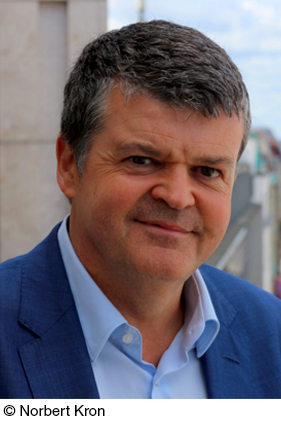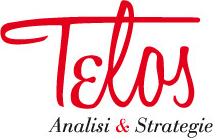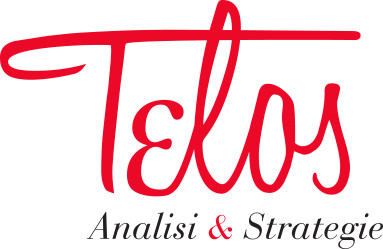September 2017, Year IX, no. 9
Bart Somers
The radicalised, extremist mayor. A fundamentalist of multiculturalism
“Insecurity and alienation are issues that need to be taken seriously. People have to feel that policymakers understand their struggles with the ever-changing world”.
Telos: Immigration and integration are among the hottest topic of the last few years, worldwide. Maybe the hottest of the current year, above all in Italy. What is your view about the latest decisions taken by the Italian Government on how to tackle immigration, mainly immigration from the sea?
Bart Somers: As a politician, I strongly believe in a harmonised European way to tackle the challenges posed by immigration. The only way to secure a dialogue based on human values is for all European Member States to adopt the same procedure. The same rules and criteria need to be taken into account everywhere. Therefore, we need a fully authorised European Asylum Support Office.
If this European strategy is to be successful, we also need a rational refugee quota plan. Based on the Geneva Convention, we need to take into account all the claims of refugees and aim to achieve a balanced demographic impact in every individual Member State. Only a harmonised procedure, and a clear engagement by all Member States will lead to a truly unified European project.
When it comes to Italy, I think it is very important to continue to focus on the role of Frontex as the guardian of Europe’s external borders. Europe also needs to ensure the creation of European registration centres (the so called ‘hot spots’).
Being awarded the 2016 World Mayor of the Year prize is an acknowledgement of all the wonderful work you have been doing as a local administrator and politician. What can local authorities do in practice to prevent radicalisation?
Preventing radicalisation is a two-way street. On the one hand, it is very important to prevent radical forces from spreading their ideology in our society. Wahabi and Salafi propaganda, mainly via the Internet and social media, is a putrid cancer that needs to be stopped. The responsibility for achieving this lies chiefly with top politicians. It needs to be dealt with on a national, European and international level.
On the other hand, local police forces and prevention workers have an important task and huge responsibility. Today, cities like Mechelen are confronted on a daily basis by the threat of radical and totalitarian Islam that aims to destroy our liberal and open social model where very diverse people live together. We need to fight this by adopting a policy of inclusiveness; I believe that an inclusive policy is the model we need to counter the aggressive, destructive radical Islamic ideology.
First of all, an inclusive society will diminish the attractiveness of a totalitarian society. People may be critical towards their own society, but they still live in it and somehow appreciate it, so they will be far less likely to choose a radical alternative to replace it.
Secondly, it is important to realise there will always be people who choose to buy into the radical narrative. Saying this is impossible would be naïve. But if these radicalised individuals find themselves surrounded by people who embrace the narrative of our society where there is no room for radicalism or violence, the radical narrative loses its strength.
Above all, it is very important to accept that in times of globalisation and migration, we all have to work to make superdiverse cities successful. We have to step away from unidirectional approaches and have the courage to say that we all need to integrate with one another in the new reality.
At local level, we have the opportunity and possibility to turn that theory into concrete action. Today many cities are all too often archipelagos made up of ‘monocultural’ islands. These cities run the risk of locking people up in what is often a caricature of a single identity. Moreover, the others remain strangers instead of co-citizens.
Local authorities can take action to prevent this kind of evolution. In Mechelen we focus on mixed schools, mixed sports clubs and mixed neighbourhoods. Multicultural environments strengthen the possibility to build a common identity. This is where local policies can make a difference. This is why in Mechelen we are investing heavily, for example, in projects to introduce diversity into youth work. We have a very ambitious but important goal: to get 100 children and youngsters with a foreign heritage involved in youth movements (boy scouts) and spark a dialogue with anchor members from different communities. Our aim is to explore thresholds and see what we can do together to increase the participation of children and youngsters with migrant backgrounds.
You often refer to a Minister of Society. What is this concept all about?
I believe we live in an age when it is very important for people to realise that we have to live together and not simply live next to one another. Therefore, I sometimes say we need a ‘Minister of Society’ who helps bringing people together, so all citizens can share a common sense of citizenship and values.
In Mechelen we try to create a dialogue where inclusion is a key value. Migration and diversity are the new norm in Mechelen (and in many other European cities and regions); we have to live up to this changing social model. We have to create an idea of co-citizenship, a shared pattern of values that gives us more freedom and more opportunities than ever before. But of course, we must never be blind to the challenges faced by society. Insecurity and alienation are issues we need to take seriously. People have to feel that policymakers understand their struggles in this ever-changing world.
Administrating a city doesn’t mean dealing only with immigration. You have been at the helm of the city since 2001. What are the other challenges you have been facing since you became Mayor?
In 2000 Mechelen was in a very downward spiral. We had a high unemployment rate, a high crime rate, severe dilapidation, and almost 30% of citizens voted for extreme right parties. When I became mayor, it was my responsibility to change this negative trend.
To fight crime and vandalism we invested heavily in security (back then people used to sometimes call me “mister zero tolerance”). We also invested a great deal in urban projects: new streets, squares and parking areas, but we also renovated our cultural and historic heritage and created a lot of green spaces.
It wasn’t only the economy that needed an extra boost, citizens also needed new reasons to be proud of Mechelen. To make people proud of their city you don’t only need bricks, you need a mental shift. As a politician I believe deeply in civic participation; it ensures that people feel they are the ones who plan the future of their city. Today, after being in office for 17 years I am extremely satisfied to see that the citizens of Mechelen are once again proud of their city. In 2000, we had the lowest score of all medium and big cities in Flanders. Today, Mechelen is one of the top performers when it comes to being “proud of your city”.
Marco Sonsini
Editorial
When a conversation turns to immigration we immediately become defensive and very rarely say what we think or, on the contrary, say it too aggressively. There’re many reasons for this. We’re afraid of being labelled a racist, do-gooder or dreamer, or maybe we simply don’t have a solution. Or perhaps we think ‘how boring, always the same old story’. That’s why we’ve purposely chosen a title that makes you feel you’re been hit by a truck: we’ve accused the off-beat Mayor of Mechelen, Bart Somers, of being an extremist, a radical and fundamentalist. Somers was awarded the World Mayor Prize 2016 for having transformed what used to be a disadvantaged and rundown town in Flanders into a model of multicultural integration for the whole of Belgium. The words of Cicero sprung to mind, the ones he pronounced when he lambasted sugary-sweet or middle-of-the-road choices when it comes to the basic principles of life: ‘I must remind you, lords, senators, that extreme patriotism in the defense of freedom is no crime (...)’. These words inspired Goldwater’s famous invective at the Republican Convention in 1964 against the Rockefeller-Scranton faction which called itself moderate and accused everyone else of extremism. The Senator boomed: ‘I would like to remind you that extremism in defense of freedom is no vice! and let me remind you also that moderation in the pursuit for justice is no virtue’. What did Somers of radical and extremist? He worked so that the people in his city were no longer an ‘archipelago of monocultural islands’ where citizens closed themselves in what was ‘often the caricature of their own identity’ and remained ‘strangers and non-citizens’. Without the community, politics dies. Today communities are practically and figuratively atomised in small units. As a result, most people consider politics to be foreign, boring and irrelevant in the best of cases, oppressive and appalling in worst case scenarios. Somers has inverted this equation. Mechelen is home to 128 nationalities: 28% of the population has foreign roots and 20% is Islamic, and yet Somers has succeeded in avoiding the political radicalisation that led to the terrorist attacks in France and Belgium. Extreme right-wing parties have dropped from 30% to 10%. ‘I gave up on forced assimilation: it doesn’t work. I also gave up on its opposite, superdiversity, dividing the city into ethnic groups. There are so many it’s impossible to create programmes that suit everyone. Anyway, those groups end up by becoming places of mental and physical isolation. Self-imposed ghettoisation’. People have to feel that are a ‘community in diversity’, but how? Our administration established common rules, explained them and makes sure they are respected. Somers is a good man, not a do-gooder. He has organised citizenship courses for new arrivals during which they are informed about what is democracy, how the police works and how to behave towards women. He’s also asked his fellow citizens, from all ethnic groups, to pitch in. After the attacks in Zaventem and Brussels he went to the mosque and said: ‘You are victims twice over. As Europeans and Muslims. React’. But when they asked for separate public swimming pools for men and women he answers: ‘Forget it. This is a secular country’.
Mariella Palazzolo

Bart Somers is the Mayor of Mechelen (Malines, in French), a city of almost 86,000 people located between Antwerp and Brussels, in Belgium. An experienced politician, Somers is also the President of the Alliance of Liberals and Democrats for Europe in the European Committee of the Regions, as well as a member of the Flemish Parliament, where he is president of the Flemish Liberals as well. He was previously the Minister-President of Flanders.
After the regional elections of June 2004, he was appointed the interim chairman of the Flemish Liberals and Democrats (VLD). On 4 December 2004, he was elected with just over 50 percent to a full term as chairman. Bart Somers was one of the three negotiators for the Open VLD during the 2007 Belgian government formation.
In June, 2016, the European Committee of the Regions adopted Bart Somers report on "Combatting Radicalisation and Violent Extremism: Prevention mechanisms at local and regional level". His opinion won cross-party support for its calls for more effective policing, for more cooperation between local, regional, national and European authorities, and for an approach based on respect for core principles.
He was awarded the 2016 World Mayor Prize, a prize for the World’s Best Mayor, in recognition of his outstanding achievements in welcoming refugees during recent years and for the long-term integration of immigrants from different cultures, religions and social backgrounds.
He obtained a Law degree from the Catholic University of Leuven.
Somers, 53 years old, is married to Miet Bourlon and has 2 children, a girl Lieze and a boy Jan Klaas. The Somers family lives in the Flanders since 1507.
Marco Sonsini







SocialTelos